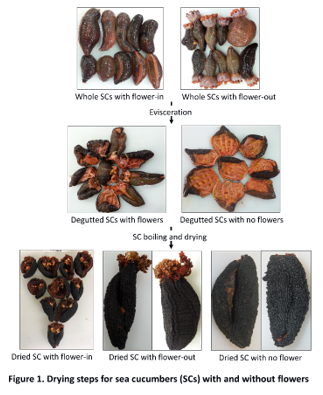DIFFERENT APPROACHES OF DRYING ATLANTIC SEA CUCUMBERS Cucumaria frondosa: PROS AND CONS
Sea cucumbers (SC) are popular as a luxury, exotic and tonic seafood in oriental countries. Their high nutritional and functional food properties can combat several infectious and degenerative diseases. Atlantic SCs play an important role in Newfoundland and Labrador’s economy. Live or fresh SCs are challenging to store and transport due to the presence of a vast quantity (>40%) of free water in their body cavity, autolysis properties, and the absence of the protective exoskeleton. As a result, more than 80% of SCs are processed to produce dehydrated products to prevent autolysis and microorganisms and facilitate their secure storage and easy transportation to the consumers. The nutritional and morphometric qualities of the dried products are affected by the handling, boiling treatment and drying technology used. The dehydration process also depends on the SC size, species, producing region and customer preference. Due to a lack of proper handling, storing, and drying, the product quality spoiled, resulting in a loss of revenue. SC body walls are transformed into cylindrical shapes by folding themselves longitudinally when they are boiled. Non-boiled ones become flattened upon drying in a hot air dryer. Upon boiling, SCs without flowers have curled better compared to those with flowers (Figure 1). The live SCs have energetic muscle bands and curled crosswise when those are slit to remove viscera. Some of them are so strong that they keep their cross curling even after boiling and drying. The drying parameters should be considered to develop a good quality SC product. The different drying processes for the Atlantic SCs, their pros and corn will be discussed.
